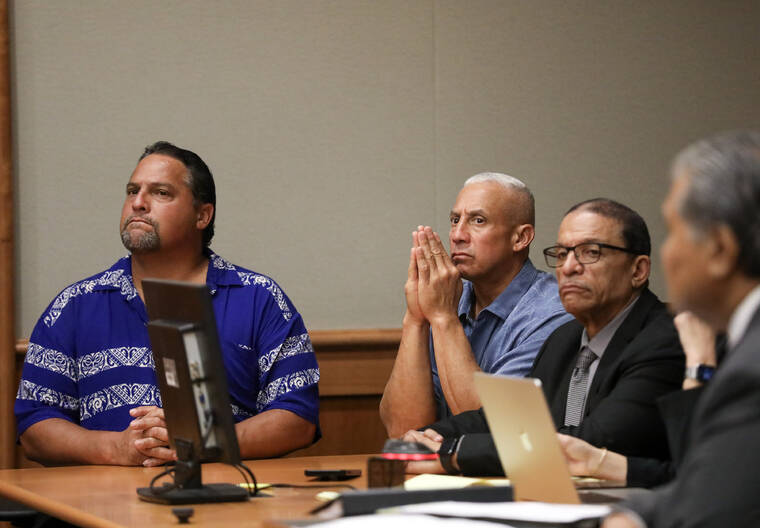Hilo Circuit Judge Peter Kubota on Thursday told the Hawaii Supreme Court his decision to release new information about the Christmas Eve 1991 abduction, rape and murder of Dana Ireland to lawyers representing two men wrongly convicted two decades ago trumps the desire of the Hawaii Police Department to keep the evidence confidential.
HPD has petitioned the high court, requesting it block the release of information regarding Albert Lauro Jr. — implicated by DNA as the previously Unidentified Male No. 1 — to Albert “Ian” Schweitzer and his brother Shawn Schweitzer, both of whom were exonerated last year after being wrongly convicted and imprisoned for the heinous crime.
“The court expressly finds that the interest of determination of actual innocence of the Schweitzers, and the public right to review matters which have been of great significance to this community in the past 33 years, greatly outweighs the HPD request to keep its investigation private,” Kubota wrote in his reply to HPD’s petition.
“He came out swinging,” Keith Shigetomi, attorney for Shawn Schweitzer, said today regarding Kubota’s document. “He’s basically saying that there’s nothing in there that ties Lauro to the Schweitzers.
“And if that’s the case, then (the Schweitzers) are entitled to that information.”
Lauro, 57, was identified as the man whose DNA was found in sperm, sweat and saliva on evidence gathered from the clothing, body and hospital gurney of Ireland, a 23-year-old from Virginia, as well as a men’s Jimmy Z T-shirt soaked in her blood.
Lauro’s DNA was found on a fork he had eaten with in public while under surveillance by the police and the FBI. He was interviewed by police on July 19, and a swab of his saliva was taken for a court-ordered confirmatory test.
Police said they didn’t have probable cause to hold or charge Lauro. He was released after being questioned and committed suicide on July 23, a day before the test on the swab confirmed he was the man whose DNA was collected from evidence gathered in the Ireland case.
Lauro was 25 and a resident of the Kapoho area at the time of the crime, which received statewide and national media attention. Lauro’s was the only DNA found, other than the victim’s, on numerous pieces of evidence collected by investigators at the time.
There was no DNA found matching either of the Schweitzers or a third man convicted of the crime, Frank Pauline Jr., at a remote fishing trail in Waa Waa where the dying Ireland was found, or at the Kapoho site where she was intentionally struck by a vehicle while riding her sister bicycle.
Ian Schweitzer served 26 years of a life sentence before his exoneration last year.
Shawn Schweitzer, who was a minor when the crime occurred, pleaded guilty to manslaughter after his brother’s murder conviction. He was sentenced to probation with a year in jail, time he’d already served.
Pauline, who implicated the Schweitzers in a confession he later recanted, was serving a life sentence when he was murdered in a New Mexico prison on his 42nd birthday in 2015. His slaying came a day after the Tribune-Herald reported the Hawaii Innocence Project was representing Ian Schweitzer.
HPD petitioned the Supreme Court after Kubota ordered evidence turned over to the Schweitzer’s lawyers.
“All of the documents and evidence you produced to me on Aug. 5 relate only to Albert Lauro Jr.” Kubota told Deputy Corporation Counsel Britt Bailey, who represents the police, in court on Aug. 7. “So I’ll ask you this: What further investigation does the police conduct with a guy who’s now deceased? You can get all of the information and all of the evidence, but what are you going to do with that? Are you going to prosecute this dead guy?
“You can go on as long as you want to delay this, but the problem I have here is these guys were convicted 23 years ago, and they’re seeking a determination of actual innocence. And in my view, justice delayed at your behest is justice denied.”
While the Schweitzers were exonerated last year — which means Kubota ruled the state didn’t have evidence that would cause a jury to find them guilty beyond a reasonable doubt — a finding of actual innocence is required for them to collect a monetary settlement under state law for their time behind bars.
It’s now up to the Supreme Court to determine if Kubota can turn new evidence in the case submitted to him by the state over to the Schweitzers and their legal team, or if police can keep the evidence secret due to an ongoing investigation.
“The whole point is that they’re entitled to due process, and due process means that we get the information — if any information exists,” said Shigetomi. “Because we’re asking for information that implicates the Schweitzers, and we are of the belief that there is none.
“(The police) just don’t want to say it.”
Email John Burnett at jburnett@hawaiitribune-herald.com.





